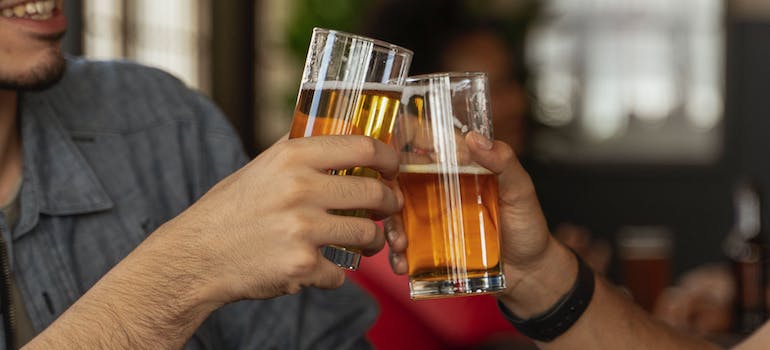The interconnection between cultural factors and substance abuse is intricate and profound. Cultural factors shape our attitudes, behaviors, and susceptibility to addiction within distinct cultural contexts. Cultural norms, values, and traditions influence the acceptance or rejection of substance use, defining what is deemed acceptable or taboo within a community. Harmony Ridge Recovery Center will explore cultural factors in addiction in West Virginia and the impact they have on the perception of help-seeking behaviors and access to treatment. Recognizing and understanding this interconnection is vital for developing effective prevention and intervention strategies.
The Substance Abuse Issue in West Virginia
The prevalence of stimulant exposure in West Virginia is alarming, as shown by recent research conducted at West Virginia University Health Sciences. It has revealed a striking statistic: nearly one in eight infants born between 2020 and 2022 in the state had in-utero exposure to opioids, stimulants, and/or cannabis. This data sheds light on the pervasive nature of stimulant use within the community, as evidenced by the substantial portion of newborns affected. The co-occurrence of stimulant exposure with opioids and cannabis emphasizes the complexity of substance use patterns in West Virginia. This concerning prevalence emphasizes the urgent need for targeted interventions at stimulants rehab in WV and public health initiatives to address the challenges associated with stimulant use.
Cultural Factors in Addiction – The Example of West Virginia
We should examine the following factors to understand the cultural dynamics in addiction:
- Cultural norms and acceptance
- Stigma surrounding addiction
Cultural Norms and Acceptance
In understanding the complex relationship between culture and substance use, it is crucial to explore the diverse norms and acceptance levels prevalent in various societies. Cultures shape our perceptions, influencing whether certain substances are embraced or discouraged.

Cultural Attitudes Toward Alcohol
Alcohol, often regarded as a social lubricant, is subject to varying cultural norms. In some societies, the consumption of alcohol is deeply rooted in social rituals and ceremonies, fostering a sense of communal bonding. This is particularly evident in West Virginia, where the historical significance of moonshine and its role in the state’s heritage has shaped a unique cultural perspective on alcohol consumption. Moonshine, once a symbol of resistance and self-reliance during Prohibition, continues to influence social gatherings and local traditions.
Contrastingly, there are cultures where abstinence from alcohol aligns with religious doctrines or cultural values. In some communities within West Virginia, this manifests in a strong temperance movement, reflecting a diverse view on alcohol use within the state. Understanding these divergent norms provides insight into how individuals within these cultures approach and incorporate alcohol into their lives.
Tobacco Use in Cultural Contexts
Tobacco use, another prevalent substance, is intertwined with cultural practices worldwide, and this is particularly evident in West Virginia. Historically, West Virginia has had a strong connection to tobacco farming, making it an integral part of the state’s economy and culture for many years. This agricultural legacy has influenced local attitudes towards tobacco, often viewing it as a traditional and economic staple.
However, contemporary West Virginia also reflects a shift in perspective, mirroring global trends of increasing health awareness and anti-smoking stances. Efforts to educate the public on the health risks associated with tobacco, along with smoking cessation programs, signify a changing attitude within the state. Examining the cultural significance attached to tobacco in West Virginia, from its historical roots to current health initiatives, sheds light on the varying degrees of acceptance and rejection of tobacco use within the community.
Perceptions of Illicit Drug Use
The acceptance or condemnation of illicit drug use is highly contingent on cultural perspectives, and this is particularly salient in the context of West Virginia. The state has faced significant challenges with certain illicit drugs, primarily opioids, which have profoundly impacted its communities. This crisis has shaped a unique cultural and social response, swinging the pendulum toward a strong emphasis on prevention, treatment, and rehabilitation.
In contrast to societies with a more permissive attitude towards specific drugs, often rooted in historical or traditional contexts, West Virginia’s approach has increasingly aligned with public health perspectives, viewing drug use as a complex issue needing a multifaceted response. The state’s efforts in combating the opioid epidemic, including educational initiatives and community-based recovery programs, reflect a broader shift in understanding and addressing drug use. Analyzing these nuanced approaches in West Virginia unveils the intricate layers of societal norms that influence individual choices and community responses to illicit substances.

Stigma Surrounding Addiction
The stigma surrounding addiction is a pervasive barrier to seeking help and receiving adequate support. This stigma, however, manifests differently across cultures, impacting individuals’ perceptions of addiction and their willingness to address the issue.
Cultural Perspectives on Personal Responsibility
Cultural beliefs regarding personal responsibility significantly influence the stigma attached to addiction, a situation that is acutely observed in West Virginia. In the state where the opioid crisis has left a profound impact, there has been a gradual shift in perspective. Historically, like in many places, addiction might have been perceived as a personal failing, leading to heightened shame and reluctance among individuals to seek help.
Thankfully, in recent years, there’s been a growing recognition in West Virginia that addiction is a complex health issue. This change is driven by the harsh realities faced by many communities and families affected by opioid addiction. As a result, there’s an increasing emphasis on empathy, support, and comprehensive care approaches. This evolving view in West Virginia mirrors a broader cultural shift towards understanding and addressing addiction not just as a personal struggle but as a public health challenge that necessitates a collective, compassionate response.
Religious and Moral Dimensions
Religious and moral considerations contribute significantly to the stigma associated with addiction, a concept that resonates deeply in West Virginia. In this state, where religious and moral values are often central to community life, addiction has traditionally been viewed through a moral lens. This perspective can equate addiction with a lack of willpower or ethical shortcomings, leading to a heightened stigma around this issue.
However, there is also a strong presence of compassionate religious communities in West Virginia that are starting to frame addiction differently. These communities see addiction as a challenge to be overcome with collective support, understanding, and often faith-based intervention. This duality in West Virginia reflects a broader struggle between traditional moralistic views and emerging compassionate perspectives that advocate for empathy and support in dealing with addiction. Understanding these varying viewpoints helps to explain the complex social dynamics at play in West Virginia’s approach to addiction and recovery.
Community and Collective Stigma
The stigma surrounding addiction often extends beyond individual perceptions to impact entire communities. In areas of West Virginia where collective efforts are being made to reduce stigma, there is a noticeable shift. Individuals in these communities are increasingly likely to seek help without fear of judgment, as there is a growing understanding of addiction as a public health issue rather than a personal failure. Recognizing how various communities in West Virginia either perpetuate or challenge the stigma associated with addiction is vital for implementing effective public health initiatives. This understanding is essential in shaping approaches that not only provide support and treatment for individuals but also foster a compassionate community environment where recovery is seen as a shared goal.

Cultural and Environmental Factors that Contribute to Addiction in WV
West Virginia, nestled in the Appalachian region of the United States, grapples with unique cultural and environmental factors that contribute to the complex issue of addiction. Examining these specific elements sheds light on the challenges faced by its residents and helps in crafting effective strategies for prevention and intervention. These factors include:
- Economic challenges
- Rural isolation
- Interconnected family and community dynamics
- Accessibility of prescription medications
- Limited educational opportunities
Economic Challenges
West Virginia has historically faced economic challenges, with industries like coal mining experiencing fluctuations. Economic instability often correlates with higher rates of substance abuse as individuals cope with stressors such as unemployment and financial insecurity. The lack of diverse economic opportunities can contribute to a sense of hopelessness, potentially driving individuals toward substance use as a coping mechanism.
Rural Isolation
The predominantly rural landscape of West Virginia presents a distinctive environmental factor. Rural areas often lack the accessibility of healthcare services, including addiction treatment facilities. Limited access to resources may hinder individuals from seeking timely assistance, exacerbating the impact of addiction on both individuals and communities.
Interconnected Family and Community Dynamics
The close-knit nature of many West Virginian communities can have both positive and negative impacts on addiction. On one hand, strong community bonds can serve as a support system. On the other hand, close connections can also facilitate the spread of addictive behaviors, as individuals may be influenced by substance use patterns within their social circles.
Accessibility of Prescription Medications
The opioid epidemic has significantly affected West Virginia, and the accessibility of prescription medications has played a role in the rising rates of addiction. Factors such as overprescribing and inadequate monitoring contribute to the availability of opioids in communities, fostering an environment conducive to substance abuse.
Limited Educational Opportunities
Educational opportunities in West Virginia can be limited, contributing to a cycle of poverty and diminished prospects. The lack of access to quality education may leave individuals with fewer options for personal and professional growth, potentially increasing susceptibility to substance use as a response to limited opportunities.
The Role of Therapy in Addressing Cultural Factors in Addiction
Therapy plays a pivotal role in addressing cultural factors that contribute to addiction, providing a structured and supportive environment for individuals to explore and navigate the complexities of their cultural context. Dialectical behavior therapy (DBT) and holistic therapy are two distinct yet complementary approaches in the realm of addiction treatment, each offering unique strategies to address cultural influences.
Dialectical Behavior Therapy for Addiction
DBT, initially designed to treat borderline personality disorder, has demonstrated efficacy in addressing addiction, particularly when cultural factors are taken into account. This therapeutic approach integrates cognitive-behavioral techniques with mindfulness, emphasizing the acceptance of both the individual’s current state and the need for change. Dialectical behavior therapy for addiction can assist individuals in recognizing and managing intense emotions, improving interpersonal skills, and developing effective coping mechanisms. Its dialectical nature encourages a balance between acceptance and change, providing a nuanced framework that respects and incorporates diverse cultural perspectives. By addressing the emotional dysregulation often associated with addiction within a cultural context, DBT helps individuals build resilience and navigate the complexities of their cultural identity.
Holistic Therapy for Addiction
Holistic therapy takes a comprehensive approach, considering the interconnectedness of mind, body, and spirit. In the context of addiction and cultural factors, holistic therapy for addiction recognizes that cultural influences extend beyond the cognitive realm to impact an individual’s physical and spiritual well-being.
Techniques such as yoga, meditation therapy, and acupuncture, integrated into holistic therapy, can align with cultural practices and beliefs. This approach acknowledges and respects the diversity of cultural backgrounds, offering a customizable and inclusive path to recovery. By addressing addiction holistically, individuals can explore and reconnect with their cultural roots, finding strength and meaning beyond substance use.

Integration of Therapies to Address Cultural Factors
The most effective treatment often involves an integrative approach that combines therapies tailored to address cultural nuances. Incorporating both DBT and holistic therapy recognizes the multifaceted nature of addiction within diverse cultural contexts. Therapists can collaborate with individuals to create personalized treatment plans that consider cultural factors. As such, they provide a more relevant and impactful therapeutic experience during benzo addiction treatment in WV or alcohol addiction rehab, for example. This integration allows for a holistic exploration of cultural influences on thought patterns, behaviors, and overall well-being. That ensures a deeper understanding of oneself.
Community Support Systems and Their Influence on Recovery
Community support systems play a fundamental role in the recovery process of people grappling with addiction. Addiction is a serious problem in WV, which is why we need community support systems. The effectiveness of these systems lies in their ability to provide a nurturing environment beyond individual efforts. This fosters a sense of belonging, understanding, and shared responsibility. It includes the following benefits:
- Peer connection and understanding
- Emotional support and encouragement
- Shared resources and information
- Reducing stigma
- Accountability and structure
- Reintegration into society

Peer Connection and Understanding
Community support systems are often comprised of individuals who have undergone therapy for substance abuse in WV and experienced similar challenges. They provide a unique form of understanding and empathy. Peer connections offer a sense of validation and shared experience, reducing feelings of isolation. These relationships help individuals feel seen and understood, fostering a supportive environment conducive to sustained recovery.
Emotional Support and Encouragement
Recovery can be an emotional process filled with highs and lows. Community support systems offer a space where individuals can express their feelings without judgment. They reinforce a positive mindset and provide strength during challenging moments of struggling with addictive substances such as Ambien. Emotional support and encouragement from peers who participated in Ambien rehab in WV are invaluable. In this sense, community members become powerful motivators that aid people in overcoming the emotional hurdles of addiction recovery.
Shared Resources and Information
Communities often pool resources, creating a network of valuable information and assistance. This may include access to local treatment centers, support groups, and educational resources. Sharing practical information within a community support system enhances individuals’ ability to make informed decisions about their recovery journey.
Reducing Stigma
Community support systems actively contribute to reducing the stigma associated with addiction. These networks challenge negative stereotypes and encourage acceptance by promoting open dialogue and understanding. This shift in perception is crucial for individuals in recovery, as it enhances their sense of self-worth. Also, it reduces barriers to seeking help.
Accountability and Structure
In a community support system, individuals are accountable for their recovery goals. This accountability provides a structured framework that helps individuals stay on track and committed to their sobriety. Whether through regular check-ins, group meetings, or shared activities, the community reinforces a sense of responsibility and commitment to the collective well-being.
Reintegration into Society
Community support systems play a crucial role in the reintegration of individuals into society post-treatment. This is especially important for people who have undergone West Virginia rehab for veterans. By providing a supportive and understanding environment, these communities help individuals rebuild relationships. Also, they help them find employment opportunities and establish a sense of normalcy in their lives.

Creating Healthy Communities
Understanding the importance of cultural factors in addiction and socioeconomic influences is essential for developing targeted interventions and fostering awareness. It is crucial to recognize that seeking professional help is a viable option. Remember that health should always be your top priority. Professional support, tailored to individual needs and cultural sensitivities, provides a chance for sustainable recovery. In prioritizing health, we empower people to overcome the challenges associated with addiction. We contribute to the broader goal of creating healthier, more resilient communities in West Virginia. Those are the communities that value and support each individual’s efforts to live a substance-free life.



